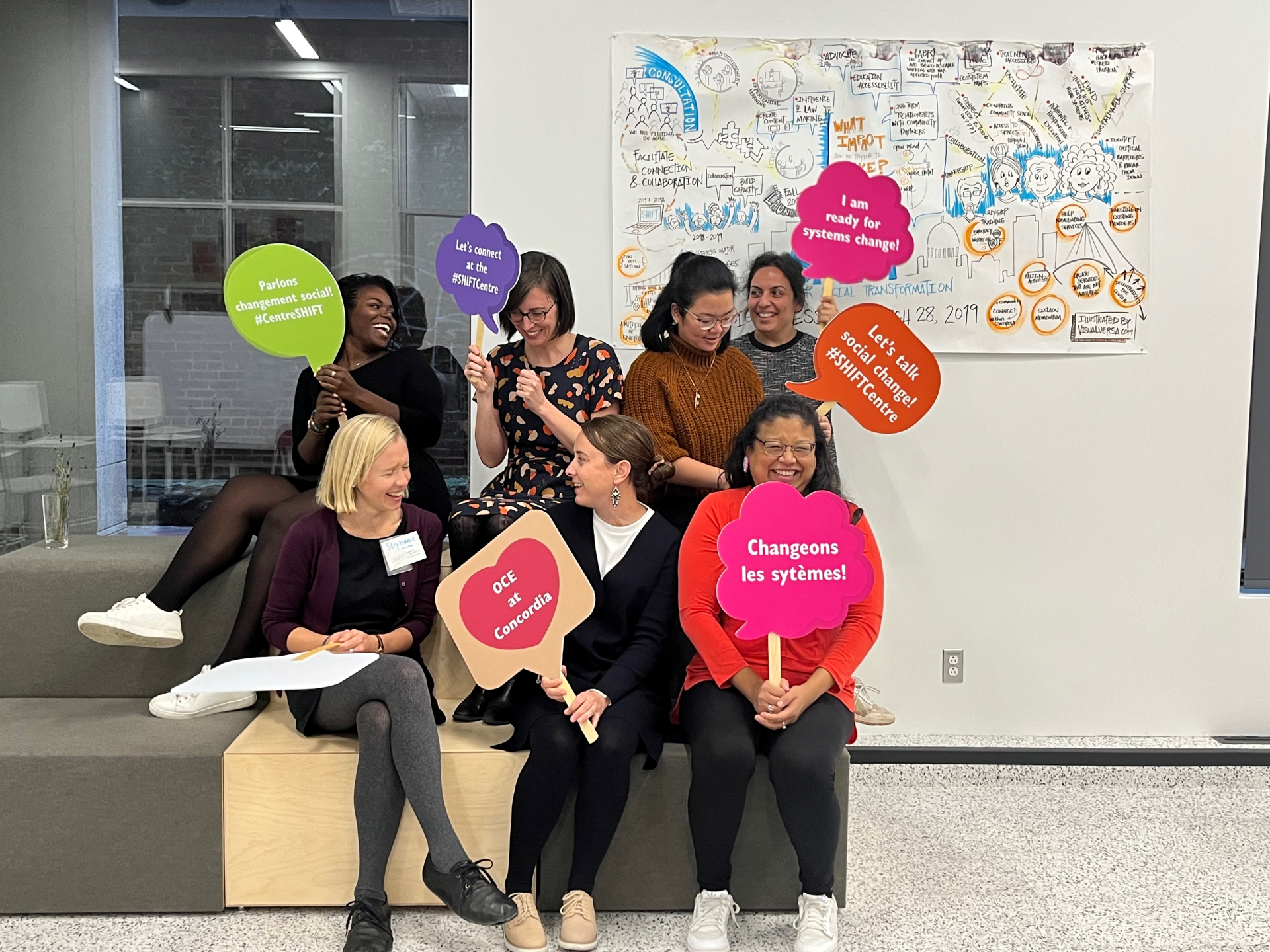Richenda Grazette is the Lead, Community Leadership & Capacity at the SHIFT Centre for Social Transformation. She works to create innovative and accessible granting & support opportunities for socially transformative projects across Concordia and Montreal, while also coordinating and overseeing the health of SHIFT's shared power governance bodies. Before SHIFT, she had spent a decade in Montreal's nonprofit and philanthropic sectors.
'Bye Bye DEI': Less Work, More Play
by Richenda Grazette
 Image from the Biodiversity Heritage Library, via Flickr
Image from the Biodiversity Heritage Library, via Flickr
This is article two in our miniseries Bye Bye DEI, the first article written by both Richenda Grazette and Maureen Adegbidi. You are encouraged to read the previous article before this one, to better understand the context and approach of this piece.
Kids learn about the world around them, their interests, and their talents through exploration and play; why can’t grown-ups do the same thing?
The nonprofit sector - particularly at the grassroots level - has been a leader in developing and implementing progressive workplace cultures: spearheading integration of what we now call “Diversity, Equity, and Inclusion”, practicing reduced workweeks and flexible hours, and operating with alternative or non-hierarchical governance structures. But the community and philanthropic sector, in general, lags behind tech and corporate workplaces in one key area: play. Not the ping-pong tables in the office kind of play (though, not a bad idea for us all), but play within our roles: experimentation with work duties, trying out new ideas, and exploring passion projects.
What would it look like to not just allow but encourage staff members to work outside of their job descriptions, to experiment with new projects or approaches to learn new skills.
“Play” and “the workplace” may sound mutually exclusive, particularly in the nonprofit and philanthropic sectors where failure to meet a deadline can drastically affect the lives or livelihoods of those depending on us. But in a broader sector in which we privilege bringing in employees that are “representative of the communities we aim to serve” (or so we’re told at least), the community and philanthropic sectors are failing at creating space for those diverse perspectives to actually shine, to use play as an anti-oppression tactic, and make transformational change to both the culture of work itself, and to the way we support our clients, grantees, and communities. Organizations seeking to hire based on transferable skills and lived experience are often not providing adequate training or space for growth for new employees, let alone adequate autonomy for experimentation, which can leave their intrinsic needs of work unmet and impact their motivation. More largely, not giving enough space for play and joy in the work reinforces the sector’s cycles of burnout, lack of innovation, and resistance to change: when we are focusing all of our energies on the urgent or immediate tasks at hand, there’s no space to rethink the “how” of our work, or to improve organizational culture.
What would it look like to not just allow but encourage staff members to work outside of their job descriptions, to experiment with new projects or approaches to learn new skills. By using words like “play” as well as “experimentation”, we attempt to reframe the purpose of this workplace shift to something more lighthearted, less outcome-oriented, and less scientific. Rather, can we try new things in our workplaces, just for fun?

Theory of Play
Against an “experimentation for outcomes” mindset
Community and philanthropic organizations should look towards play and pleasure in activism as their theoretical bases & models for implementation. Take this conversation between two community organizers Kai Tzeng and KJ Kearny, speaking about how they integrate literal play (games & improvisation) into their cultural work. To them, play “is more than just an activity—it’s a mindset. It brings creativity, pleasure, innovation, and it's a choice to do something that kind of challenges us in a safe space”. They highlight that through games, “imaginative exercises”, and art-making, people are better able to “stretch and dream into new possibilities and ways of being or relating to each other”.
Play and experimentation attend to our intrinsic needs in a workplace like achievement, advancement, values alignment, growth. When considering adding more experimental play into the workplace, we must remember that it is not for the betterment of our organizational output, it is about the betterment of employee experience, and the culture in which they work. It should be about their learning, their growth as individuals, and their pleasure more than it is about the benefit to stakeholders.
The employee’s experience of learning should be of paramount importance. Whether accessing formal trainings or learning as they go, they are given additional hours and space to pursue passions that will either support them in their careers going forward or increase their motivation in their current roles, centering joy rather than tethering employees to a job description. As Cyndi Suarez says, play “allows for encountering new situations”, for experimenting with other ways of being and imagining the future. When we invest in the growth of individuals, particularly traditionally marginalized groups, we build up their individual skill sets towards an overall stronger sector: with better capacity to collaborate, to envision themselves staying in socially impactful work, for more love of what they do.
Play and experimentation are direct challenges to the capitalist design of work. In your organization, are you working towards systems change? If yes, then why does your internal culture look so different from the world you’re trying to see?
Play as Liberation
Play and experimentation are direct challenges to the capitalist design of work. In your organization, are you working towards systems change? If yes, then why does your internal culture look so different from the world you’re trying to see?
As Maureen and I discussed in our first article in this series, white supremacy culture and capitalist cultures in workplaces rely on urgency, perfectionism, and power concentration (amongst other factors) to maintain spaces in which oppression sits securely. These factors diminish potential for diverse opinions and experiences to flourish meaningfully, for power to be shared, and for marginalized groups and/or younger workers to access the professional and personal development they need. Feminist and queer theorists have for decades emphasized the concept of caring for oneself as a radical act, particularly Black Feminist thinkers like Patricia Hill Collins and Audre Lorde. Although an admittedly very loose interpretation of their original pieces, we can see play as a tactic for breaking and liberating us from white supremacy culture in the workplace.
Enter, play. Genuinely investing in a culture of experimentation can be a radical shift in the way people engage in their workplace. Instead of taking inspiration from corporate models, community and philanthropic organizations should look towards play & pleasure in activism as their theoretical bases & models for implementation. Cyndi Suarez (in The Purpose of Play) writes that play “is a penalty-free space for rehearsing the social give and take of living in community”: it functions fractally, a means of practicing on a micro level what we want to see in the macro world. Or as adrienne marie brown says, “See[ing] our own lives and work as a front line, a first place we can practice justice, liberation and alignment with each other and the planet”. Do we not envision a society with more fluidity and movement for all, where we can follow threads of interest towards new knowledges and skills?
At SHIFT, we work in a highly experimental, fluid, and iterative culture. We have high degrees of latitude to design our own positions and programming, to choose the stakeholders we consult, and make mistakes in the process of learning. Take, for example, our funding programs. We redesign our granting programs each round, and through each moment of saying “that criteria area didn’t make sense after all”, we come closer to understanding how to build more accessible grant systems, how SHIFT can be better at meeting the needs of the sector, how different identities, abilities, and capacities affect how selection committees review applications, and the potential we haven’t yet tapped in the program. All of this is enabled because of a sense of safety in failure - of combating perfectionism through investing in a style of work that seeks to learn as it serves. Through these failures, I learn about better how to better apply so-called-DEI in my work, while always letting my stakeholders know that I’m learning with and through them.
Play and experimentation also strongly support more accessible workplaces. Culturally, play and experimentation require a slowing down of work with less structure in job descriptions. Not only does building flexible hours help an employee adjust to life’s many surprises, but it also helps employees adapt their work to and better understand their brain types and particular accessibility needs. This is true both inside and outside of their specific portfolios, both changing their workflows to their ways of working and through discovering new areas where they can shine.
Investment in play and experimentation feeds and is fed by a culture of trust and safety for employees. Nothing demonstrates trust better than open time in a workweek that empowers an employee to use and build on the expertise gained through both their lived and professional experiences. When employees feel that their ideas are valued, respected, and celebrated, with ample space to pursue them, there is improved belonging and trust that – again – breaks down hierarchies of oppression and profession towards a more inclusive, democratic, and values-oriented workplace.
Getting Started
Jo Freeman’s essay “The Tyranny of Structurelessness” tells us about the risks inherent in organizations and movements that “have no structure”, and the threat that that structurelessness poses to accidentally reproducing dominant and societal power dynamics. This concept feels pertinent when it comes to play and experimentation: leaders and workers alike should reflect on what it would look like to create intentional play infrastructure (a playground, if you will) that holds up employee investment in their own learning and maintains clarity for all about what experimentation means and can look like.
A full integration of play into the workplace is a long, intentional process of cultural shift. But there are changes or processes you can explore in your workplace right away that begin setting those intentions and opening conversations within your team about creating a different kind of workplace: one ready for good-failures, growth, improved culture and services, and - ultimately - innovation.
1. Review Job Descriptions
Try building a certain number of hours (per week, month, etc depending on your current structure) for building “projects of interest” into contracts and job descriptions. This should be on top of professional development, as it should be framed as a “free space” for your employees to explore. There shouldn’t be any deliverables or expectations of this free space, and entering employees should understand that this is time for dreaming and learning, within or outside of their particular job description.
If you’re in a work environment where “there’s too much work to do to give hours to exploration”, it’s worth thinking about ways to scale back your expected outputs. Again, freeing employees from short-term orientations, senses of urgency and perfectionism will ultimately help them feel and perform better in the long term.
2. Invest in Learning
Obviously, investing resources into training is crucial, but not just for things that are explicitly pertinent to an employee’s role responsibilities. If you can afford to, create a no-questions-asked professional & personal development budget for employees. With this, make sure your employees use these freer budgets, by encouraging them to think about anything they want to learn, and helping them find the place to get it. Reminder: experiences or materials (like books) are just as good as conferences and workshops, so be open to whatever an employee deems important.
3. Checking In
During your regular check-ins with employees or colleagues, engage in deep listening and dialogue about their areas of interest. This is important for supervisors too: by openly discussing and role modeling how you spend time on your interests in the context of work, you validate the worthiness of play (and making time for it) with those you supervise. Here’s some potential prompts to think about during regular check-ins:
- Is there something you’ve been wanting to learn more about or explore, related to your specific portfolio or beyond?
- I notice you haven’t used your professional/personal development budget yet this year. Can we make a plan around how you’ll use it, and on what timeline?
- Is there a project you’ve been dreaming of that you haven’t figured out how to make time for yet? Tell me about this dream and what excites you about it.
- Do you want to spend some time now together looking through your capacity in the next few months to find some time?
- How is your project/learning going? Is there something you’d like to change about the way it works? Do you think you’d like to add more or reduce it, and why?
4. Use postures of curiosity and learning
When an experiment fails or doesn’t make sense for the organization, engage in a session around the why and potential changes that can be added in the next iterations. Failure (of a component or of the project as a whole) shouldn’t result in project cancellation, but rather reorientation. Here’s some questions to think through or discuss with colleagues after moments of “failure”:
- What were the biggest takeaways from this experiment/project?
- What elements of this experiment/project do you want to keep? Either concepts/approaches/objectives, or some of the activities.
- What elements of the experiment/project do you want to refine, change, or let go of? Tell me about them.
- Do you want support in reorienting or strategizing this project? Is there more you need to learn before trying again, that we can support you in accessing?
Encouraging play and experimentation in the workplace can seem like a daunting task, especially in service-oriented or smaller nonprofits with restraints on budget and time and dealing with already-unattainable demands from clientele. But the advantages and potential within it cannot be understated: by accessing other parts of our brain and tapping into creativity, we become a more inclusive space that brings in talented and passionate staff members who would likely not be engaged otherwise. Freedom to explore and frolic in the work, with a safe landing space when (inevitably) experiments don’t pan out, is one key example of cultural shift that any organization can make towards a more diverse and equitable workplace, that goes beyond just talking about it and, instead, creates new infrastructures that serve everyone.




